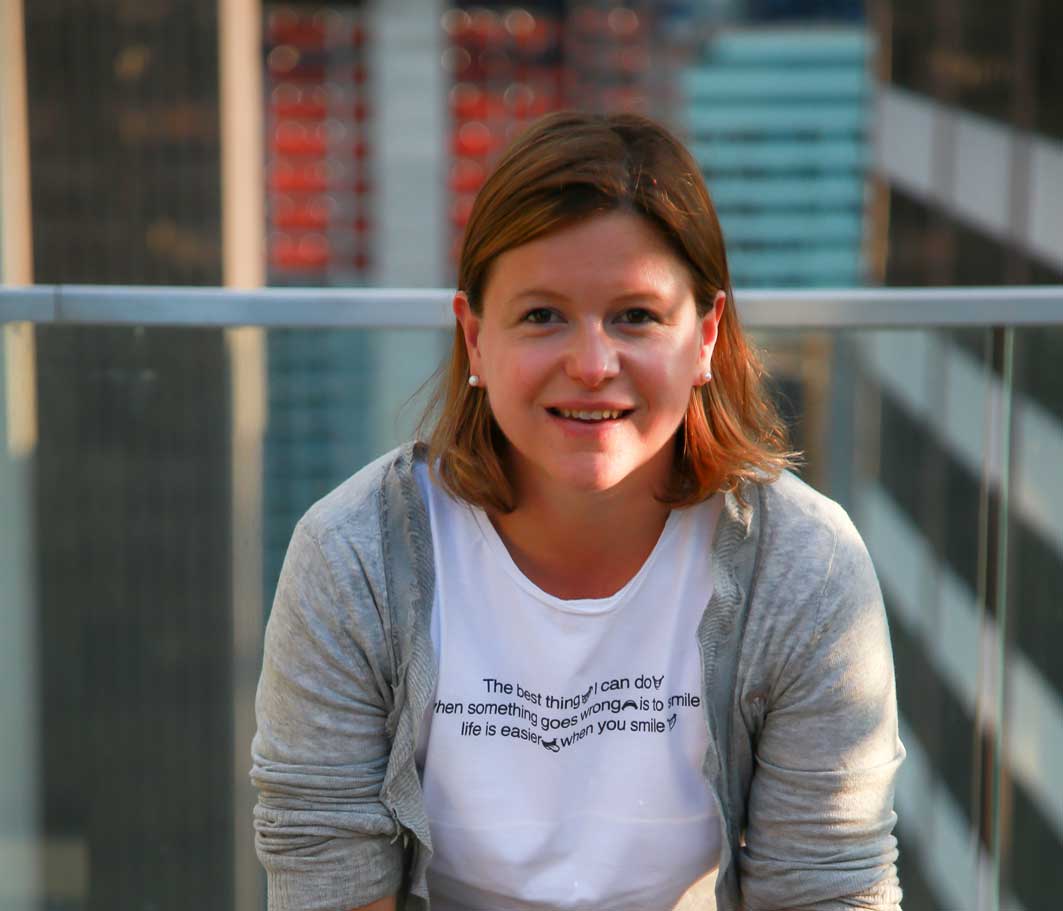
Sommelier Spotlight: Katja Scharnagl
In this fifth Sommelier Spotlight, I speak with Advanced Sommelière Katja Scharnagl in New York, one of the international figureheads of the Austrian sommelier scene. Katja is also my partner for our online tastings in the New York area. As an aspiring Master Sommelière, she tastes the wines of our winemakers together with her study group.
STEPHANIE ARTNER
February 2022
Photo: Katja Scharnagl
Katja, tell us about your job as head sommelière at Le Bernardin New York, what was a typical day like for you?
Katja: When I worked luncheon service, my typical day started at 9 am. At first, there was always a lot of office work with emails from vendors, guests, and the event department needing wine recommendations. I also handled the wine list, analyzing quotes, creating prices, had appointments with the finance department for budgets, placed wine orders, and entered new wines into our inventory system, "Binwise." If a course on the menu changed, I also met with the Executive Chef to discuss a new wine pairing. At 10 a.m., I then went to the restaurant to get the wine racks ready for service and also to attend tastings with distributors and producers. At 11:45 a.m., lunch service began for me at the restaurant.
After lunch service, I was able to do one of my favorite jobs in the wine cellar. I unpacked new wines, sorted them, added them to our inventory system, and placed new orders. And of course, there was still plenty of office work to do, because the e-mails never stopped.
At 4 p.m., there was a lunch break and more meetings with the boss for menu changes. By 5 p.m., I was back at the restaurant for evening service. After evening service, I would pop into the office to answer emails and place any necessary orders for the next day. On my way home, I was usually at midnight. If I didn't have lunch service, my day started at 1 p.m. with the office work I mentioned earlier. In addition to this regular work, there was the monthly inventory and regular team meetings. It was never boring!
In the last two years there have been many challenges in the hospitality industry, but also calls for change e.g. more diversity in the workplace, more protections for women in the workplace and in education, etc. How did you perceive this call and did it shape or influence you in any way?
Katja: Fortunately, something is slowly changing and the wine industry is moving away from the arrogant and elitist "all-white boys club". Wine should be fun! The Court of Master Sommeliers (CMS) has made a lot of changes in the organization after the scandal that was uncovered by the New York Times. I'm not sure it will be enough, but they are on the right track. At Le Bernardin, we've always had a very diverse team, at one point including only women, and from all ethnic backgrounds. Establishments definitely need to think about something, though, especially since there has been a serious shortage of staff since the pandemic. Many have lost their jobs and with it their health insurance, this has inspired many to change careers completely. In my opinion, the restaurant industry needs to be more responsive to its employees, offer more flexible hours, more fixed wages, and health insurance. The work will not become less, but the companies definitely need to invest more in their staff, especially if they want to keep the good people longer.
What advice would you give to young, ambitious women in the hospitality industry who want to pursue a career as a sommelier?
Katja: A passion for learning and not being afraid of physical work are a must. My advice is to stay curious, learn, take inventory to get to know the cellar better, attend tastings and also ask for help if a wine shipment is ever too big. Professionalism and hospitality are the highest priority.
How have you perceived the Austrian Wine Boom in New York and the rest of the USA in the last 10 years? What has changed positively? What do you think winemakers, importers, and consumers can do to further boost Austrian success?
Katja: Austrian wine is held in very high regard by all sommeliers. The tastings are always well attended because the topics are relevant and the events are always top organized. This is very much appreciated in a city like New York, where there are dozens of events every day. Austrian wines are also a fixture at blind tastings with colleagues.
Many guests have heard of and/or tasted the "Grooner." We are in that sweet spot where, as a niche product, we have super quality at a good value. In my opinion, it would be important for producers to focus more on "our" grape varieties for export, to further differentiate themselves from the masses. Quality products and also the organic category got their price and so we should in no case migrate to the cheap line. This perception is also important for the consumer, especially because many are just discovering our wines.
Katja, you were just on a visit back home and also visited a few wineries. Can you share a few highlights with us? Do you have any recommendations for our readers' next visit to Austria?
Katja: Austrian wine has all the ingredients it needs to position itself very well on the international market: sustainability, innovation, curiosity, outstanding quality, diversity, and a young generation of winemakers who are pushing boundaries and redefining what historic regions can produce.
Every wine region in Austria is worth a visit because there are so many great wineries. Here is a small excerpt from our Tour de Vin with our 5-month-old daughter, who loves wineries but especially Riesling :)
• Burgenland: Nittnaus, Prieler, Franz Weninger, Kracher
• Steiermark: Gross, Tement, Christoph Neumeister, Stefan Schauer
• Wachau: Grabenwerkstatt, von der Vogelwaide, Peter Veyder Malberg, Martin Muthentaler, Martin Mittelbach, Josef Fischer, Wolfgang Supperer, Johann Donabaum
• Kamptal: Hirsch
• Wien: Alexander Zahel
Thank you Katja for your insightful interview. Next up is Beatrice Bessi, Head Sommelier of the Chiltern House in London.




